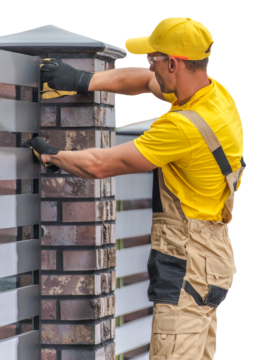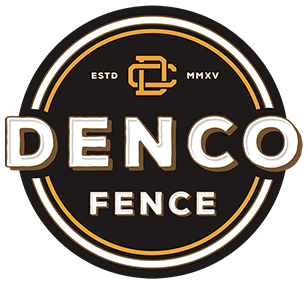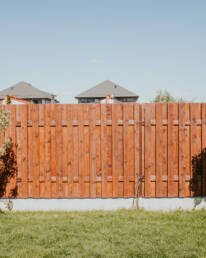When homeowners install top-quality fencing, that fence should last for many years if cared for properly. There are various damages that may occur, but if homeowners look out for the following 5 common types of fence damage, their fence lifespan may be extended longer.
1. Stains, Mold and Mildew Growth or Insect Related Damages Including Rot
Stains are probably the most commonly noticed type of fence damage. This can be caused due to faded fencing finishes that can result from exposure to harsh sunlight and heavy downpours along with other environmental exposure risks. Dirt, grime and other debris can get into the fence’s interior layers not protected by sealing finishes and other protective measures.
Water damage can occur on fencing that is made with natural woods, metals, and on some other fencing materials. If the water damage cause is not found and remedied in a prompt manner, that moisture can cause surface paint, stains and other finishes to become raised and broken down eventually destroying the untreated center layers of the fencing materials.
Moisture that seeps into fence portions can begin to develop further problems such as mold and mildew growth. This can be costly to repair and requires more effort as well. Sometimes, rotted portions of a fence may be caused by insects. In this case, the insect problem needs to be identified and addressed for the best chance of returning your fence back to its previous condition.
2. Improper Fence Installation or Posts/Panels That Lean or Have Fallen
It is also common for fences to have posts and fence panels that lean towards one side or have already fallen. This can cause the entire integrity of the fence to be put at risk. This kind of problem could be due to improper fence installation, changes in the soil that may shift the supportive posts in and near the ground and by other environmental factors.
Environmental factors that cause fences to lean or fall include high winds, heavy rainstorms or snowfalls, icing in brittle cold temperatures and possibly from nearby wildlife, like moles, gophers and other vermin, that have a tendency to dig up a yard forming many underground tunnels that may cause a fence to shift.
It is important to fix these major fence damages quickly, as the entire stability of the fence is compromised.
3. Rust or Corrosion Noted Especially on Metal Fencing or Fence Hardware
Rust or corrosion seen on any portion of a fence demands attention promptly to slow and eliminate further damage that can be costly to fix. This is generally caused by retained moisture, and this is a common problem seen in fences that are not treated for withstanding environmental and weather-related exposure.
Corrosion and rust occur more frequently with untreated wooden or metal fencing. This can be effectively prevented by applying a finishing seal designed for just this purpose. Then, the fence will need reapplications of these finishing seals on a regular basis especially in areas where rain, snow and ice are an ongoing occurrence.
To deal with rust patches that are already present, take time to sand down the rust with an abrasive sandpaper or other tool gently scraping away the rust and corrosion particles. Afterwards, apply the appropriate sealant to prevent any further damage.
Rusted sharp objects often contain particles of soil, other contaminated debris and microbial organisms that can cause serious illnesses like tetanus, infections and other ailments. If an individual is punctured by a rusted object, they may require a tetanus shot or booster.
4. Fencing Panels That Are Warped, Gates That Sag & Tilted Posts
A property owner may notice that their fencing panels and other portions of the fence are warped, sag downwards or have tilted posts. If left untreated, further damage could occur and may necessitate a fence replacement in the worst cases.
It is crucial to regularly inspect all areas of your fencing on a regular basis. Sometimes, these fencing issues are not readily apparent from a distant view. If a gate sags and drags across the ground or other surface, this can create quite a problem and may cause the gate to become dislodged and/or to cause landscape or other surface damage underneath the areas where the gate hangs down.
5. Noticeable Gaps, Holes, Missing Portions or Other Environmental Damages
Doing a regular inspection of your entire fence is also a good way to catch noticeable gaps, holes, missing or broken fence pieces or other environmental and weather-related fencing damages.
In addition to at least a once-a-year inspection, it is essential to inspect how your fence fared after a significant weather event that could cause portions of the fence to dislodge, blow away or crack causing moisture to get into the inner fence layers.
Discover some easy fence related tips with regards to prevention and repair measures intended to stop or fix fence damages.
Tips on How to Keep Your Fence in Good Condition All Year Long
Make sure to hire only professional fencing contractors to install your fence unless you are very experienced and have the necessary tools and training. Wooden and metal fences often need a protective finish reapplied on a regular basis.
Inspecting your fence after storms and other weather events goes a long way towards ensuring the safety and integrity of your fence. Many fencing contractors also provide safety inspections and general maintenance tasks that could be a great help to property owners.
Preventing Fence Damage Is Crucial to Preserve Integrity of Fence
There are some grave risks to leaving a fence fall into disrepair. This may end up putting your surrounding property at risk as well as posing a significant risk to young children who play outdoors and need a safety enclosure.
A broken or damaged fence may also let in other wandering creatures including other stray animals. A warped or leaning fence also poses a risk of injuries for pets and people who are near to the gate or fence.
Conclusion:
Watch out for the above mentioned 5 common types of fence damage and perform the preventative strategies to keep your fence in good condition and in working order. Consider consulting with a nearby fencing contractor for further assistance and more information.
Contact Denco Fence Company by phone at (303) 223-6902. Visit our webpages online via Inquiries@dencofence.com or fill out our estimate form.

Need an expert opinion? Talk to our experts today!
When you talk to our experts at Denco Fence Company, we’ll help you compare fence styles, share design ideas, and answer any questions along the way. If you’re looking to build or repair a fence that you and your neighbors are going to love, get a free estimate and let us help bring your project to life.

